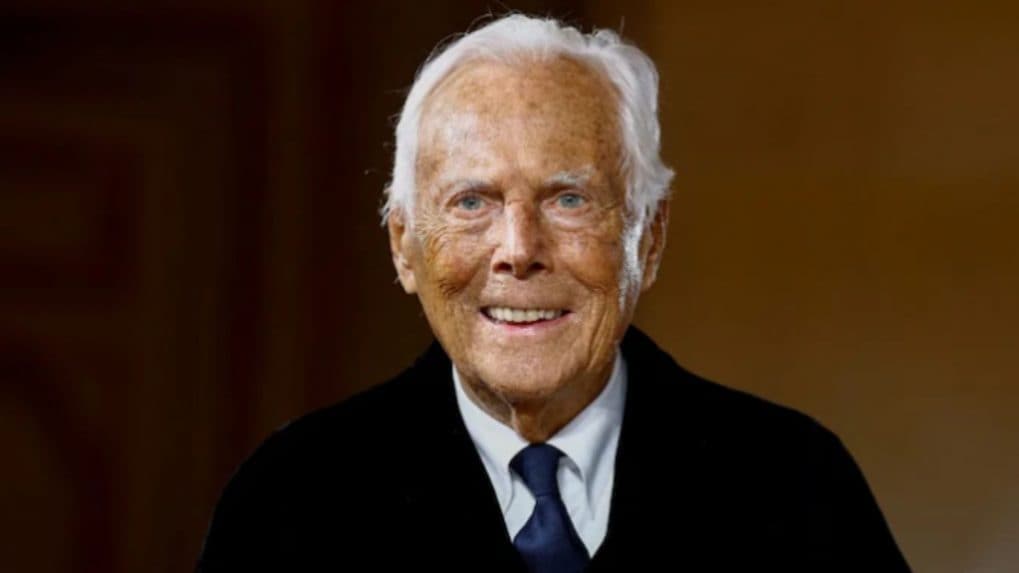Fashion world mourns ‘King Giorgio’: Armani passes away at 91
The company said a funeral chamber will be set up in Milan on Saturday and Sunday, September 6 and 7, where admirers and colleagues will have the opportunity to pay their respects.
ADVERTISEMENT
The global fashion industry bid farewell to one of its most iconic figures on Thursday as Giorgio Armani, the legendary Italian designer and founder of the Armani fashion empire, passed away at the age of 91. Armani’s fashion house confirmed the news in a heartfelt statement that read, “With infinite sorrow, the Armani Group announces the passing of its creator, founder, and tireless driving force: Giorgio Armani.”
The company said a funeral chamber will be set up in Milan on Saturday and Sunday, September 6 and 7, where admirers and colleagues will have the opportunity to pay their respects. A private funeral service will follow at an unspecified date, reflecting Armani’s preference for privacy in personal matters despite his public stature.
Reports from Reuters indicate that Armani had been unwell for some time and was unable to attend Milan’s Men’s Fashion Week in June, marking the first occasion in his decades-long career that he missed one of his own catwalk events. The absence was noted at the time as unusual, given Armani’s reputation for meticulous involvement in every aspect of his brand.
Born on July 11, 1934, in the northern Italian town of Piacenza, south of Milan, Armani’s early ambition was to pursue medicine. However, fate steered him in a different direction when a part-time job as a window decorator at a department store introduced him to the world of fashion. That experience sparked a passion that eventually reshaped the global fashion industry.
In 1975, Armani, alongside his partner Sergio Galeotti, launched his own menswear label. To raise the initial funds, the duo sold their Volkswagen for $10,000, a modest beginning that belied the immense success that would follow. Within a year, the label expanded into womenswear, setting the foundation for what would become one of the most influential fashion empires in the world.
Armani’s designs revolutionized fashion in the late 1970s with his signature unlined jackets, simple trousers, and muted urban color palettes. His relaxed yet sophisticated silhouette placed Italian ready-to-wear on the global stage, offering a new vision of elegance that moved away from rigid tailoring toward effortless refinement. This understated approach to luxury resonated across cultures, making his name synonymous with timeless style.
Nicknamed “Re Giorgio,” or “King Giorgio,” Armani became renowned not only for his creative vision but also for his exacting standards. He was known to oversee every detail of his collections, from advertising campaigns to the smallest elements of runway shows, even adjusting models’ hair before they walked the catwalk. This hands-on approach became a hallmark of his legacy, reflecting both his dedication and his relentless pursuit of perfection.
By the time of his death, Armani had built an empire valued at over $10 billion, according to Forbes. His brand extended far beyond clothing, encompassing accessories, home furnishings, perfumes, cosmetics, and even lifestyle ventures such as books, flowers, and chocolates. Armani also made significant inroads into hospitality, launching more than 20 restaurants around the world since 1998, including in Milan, Paris, and Tokyo. He further expanded his brand with two luxury hotels—one in Dubai in 2009 and another in Milan in 2010—that embodied his aesthetic of understated sophistication.
His influence stretched into the world of sports as well. Armani owned EA7 Emporio Armani Milan, a basketball team more commonly known as Olimpia Milano, one of Italy’s most successful clubs. His patronage of the sport mirrored his broader cultural impact, where his name came to represent not just fashion, but a lifestyle.
Throughout his five-decade career, Armani dressed some of the world’s most famous personalities, from Hollywood stars to political leaders. His designs became a red-carpet staple, symbolizing elegance without ostentation. Yet, despite his fame, Armani remained deeply private, preferring his work to speak louder than his persona.
The announcement of his death has prompted tributes from across the world. Fashion houses, designers, celebrities, and fans have expressed sorrow over the loss of a visionary who reshaped modern style. Many have highlighted his ability to blend simplicity with sophistication, creating garments that exuded quiet power while remaining approachable.
As Milan prepares to host Armani’s funeral chamber this weekend, the fashion capital will no doubt become a site of collective mourning. For many Italians, Armani was more than just a designer—he was a symbol of national pride, a figure who took Italian craftsmanship to the global stage and transformed it into a language of universal elegance.
Giorgio Armani’s legacy endures not only through the empire he built but also through the philosophy of fashion he championed: that true style lies in restraint, clarity, and timeless appeal. As the curtains close on a remarkable life, the fashion world is left with the enduring imprint of a man who, starting with a single unlined jacket and a dream, redefined what it meant to be modern, elegant, and effortlessly chic.


